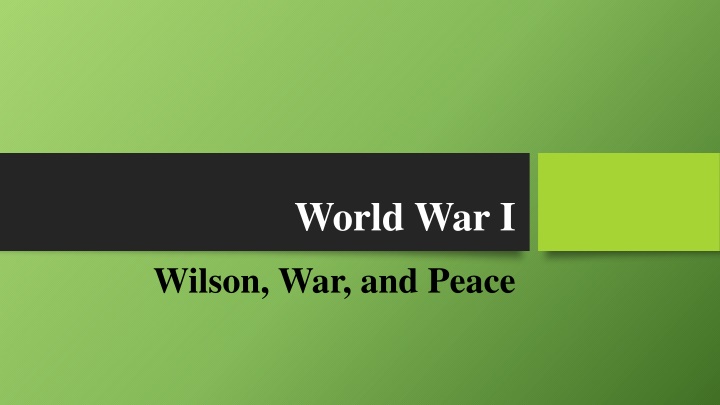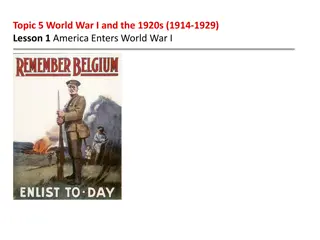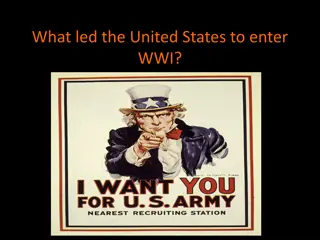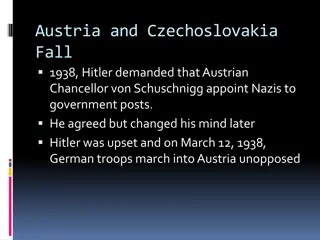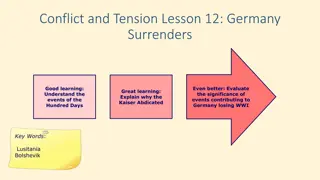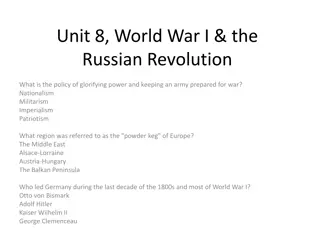World War I: US Entry and Convoys Changing the Tide
World War I had reached a deadly stalemate on the Western Front until the US entered the conflict, providing the Allies with crucial support. The adoption of convoy systems helped protect shipping and significantly reduced losses from German U-boat attacks. However, the struggle continued as the Central Powers gained momentum on the land, leading to significant political changes in Russia and shaping the course of the war.
Download Presentation

Please find below an Image/Link to download the presentation.
The content on the website is provided AS IS for your information and personal use only. It may not be sold, licensed, or shared on other websites without obtaining consent from the author.If you encounter any issues during the download, it is possible that the publisher has removed the file from their server.
You are allowed to download the files provided on this website for personal or commercial use, subject to the condition that they are used lawfully. All files are the property of their respective owners.
The content on the website is provided AS IS for your information and personal use only. It may not be sold, licensed, or shared on other websites without obtaining consent from the author.
E N D
Presentation Transcript
World War I Wilson, War, and Peace
Giving the Allies an Edge By the time the US entered World War I, the conflict had become a deadly, bloody stalemate On the Western Front in France, both sides had tried desperately to break the stalemate and failed It would take the US entry into the war to turn the tide toward and Allied victory
Giving the Allies and Edge To European leaders, the United States was a relative unknown Many doubted the US could raise, train, equip, and transport an army fast enough to influence the outcome of the war Desperate German military leaders renewed unrestricted submarine warfare trying to end the conflict before the US got involved
Convoys Protect Shipping The Allies felt the impact of submarine warfare as the Germans sank more merchant ships faster than replacements could be built The Allies finally adopted the convoy system (groups of merchant ships sailing together protected by warships)
Convoys Protect Shipping Convoys had an immediate impact on the war Convoys made up of British and American ships proved to be an instant success Shipping losses from U-boat attacks fell sharply and Germany s gamble failed
The Allies Struggle The battle on land began to swing in the favor of the Central Powers The Allies were exhausted by years of combat and the Russia was torn by civil war March 1917: a moderate, democratic revolution had overthrown Czar Nicholas II but kept Russia in the war
The Allies Struggle November 1917: radical communists led by Vladimir Lenin staged a revolution and gained control of Russia Lenin pulled Russia out of the war in December, and on March 3, 1918 the Treaty of Brest-Litovsk ended the war between the Soviet Union and Germany With the end of the war on the Eastern Front, Germany began moving soldiers to the Western Front
The Allies Struggle With more soldiers coming to the Western Front, the Germans launched an all-out offensive in the Spring of 1918 The fierce attacks threatened to break through Allied defenses and open a path to Paris
American Troops Join the Fight General John J. Pershing, the commander of American forces in Europe, arrived in France in June 1917 American troops did not arrive in France in large numbers until early 1918 By March 1918, Allied counterattacks and German exhaustion ended the great German offensive
Americans Distinguish Themselves American troops called doughboys saw significant action in the late spring and summer of 1918 The Americans participated in both offensive and defensive battles, and though it took time they learned quickly and fought bravely
Americans Distinguish Themselves One of America s greatest war heroes was Alvin York from Tennessee While trapped behind enemy lines, York and 16 other soldiers attacked several machine-gun nests When the fighting was over, York and his fellow soldiers had taken the German position which earned him the Congressional Medal of Honor
Americans Distinguish Themselves African Americans fought bravely during the war, despite facing discrimination in the US Army By the end of the war, 1.3 million American soldiers had served on the front, more than 50,000 had died, and about 230,000 had been wounded
The War Ends The American troops gave the Allies a military advantage By the fall of 1918, German and Austro-Hungarian armies had had enough, and many men deserted, mutinied, or refused to fight On November 11, 1918 Germany surrendered to the Allies in a railway car in Compiegne
The War Ends Of the millions of troops who mobilized, almost 5 million Allied and 8 million Central Power troops were dead Wounded: Allied- 12 million, Central Powers- 8 million Nearly 6.5 million civilians died in the terrible conflict
Peace Without Victory Vladimir Lenin maintained that the war was nothing more than an imperialistic land-grab He revealed secret treaties Russia made with the other Allies where they agreed to divide the German and Ottoman Empires
Peace Without Victory For President Wilson, the war was about peace and freedom January 1917: Wilson introduced the idea of peace without victory to Congress Victory would mean peace forced upon the loser and would leave a sting, a resentment, a bitter memory upon which terms of peace would rest
Peace Without Victory January 1918: Wilson outlined for Congress his Fourteen Points which outlined his idea of peace without victory Fourteen Points encouraged openness, independence, and supporting freedom Wilson wanted open diplomacy, freedom of the seas, free trade, reduction of arms, and ending colonialism
Peace Without Victory Wilson championed self-determination (the right of people to choose their own form of government) He asked for a League of Nations to secure mutual guarantees of political independence and territorial integrity to great and small states alike In 1919, Wilson traveled to Versailles to represent the US at the peace conference
Wilson at the Peace Conference The Allied leaders at the Peace Conference were known as the Big Four Woodrow Wilson (US) David Lloyd-George (Britain) Georges Clemenceau (France) Vittorio Orlando (Italy)
Wilson at the Peace Conference Wilson s idealism did not inspire the other Allied leaders They blamed Germany for starting the war and felt that Germany make reparations (payments for war damages) They wished to weaken Germany so that it would never threaten Europe again
Wilson at the Peace Conference Lloyd-George wished to preserve the colonial status quo while Clemenceau wished for Germany to pay dearly and return Alsace-Lorraine The Allied leaders chipped away at Wilson s Fourteen Points, but Wilson kept pushing for a League of Nations Wilson refused to compromise on the League, and the Allies finally voted to make the League part of the treaty
Problems With the Peace The Versailles treaty created as many problems as it solved The new map of Europe that emerged violated self-determination as often as it was confirmed In the Middle East, several ethnic groups were clustered together randomly
America Rejects the Treaty Wilson knew the treaty was not perfect, but he hoped the League could correct its problems Many German Americans thought the treaty was too harsh Germany Irish Americans criticized the failure of creating an independent Ireland
America Rejects the Treaty Wilson s biggest hurdle was the fact the treaty had to be submitted to the Republican-controlled Senate Some senators believed the US should not get involved in world politics or world organizations Many of these isolationist senators opposed the League of Nations, particularly Article 10 which called for mutual defense of member nations
America Rejects the Treaty Henry Cabot Lodge led another group of senators called reservationists who opposed the treaty as it was written Many reservationists believed Article 10 would lead the US into war without the consent of Congress These senators did agree to vote for the treaty if revisions were made, however Wilson was not willing to compromise
America Rejects the Treaty When the Senate delayed ratifications, Wilson went directly to the people Though he was sick, Wilson crossed the country giving 32 addresses in 33 days
America Rejects the Treaty Wilson s health failed on September 25, 1919 and he suffered a debilitating stroke In November 1919 the treaty was brought before the Senate and rejected Most senators were not isolationists, however at a moment that demanded compromise, Wilson and his opponents refused to do so Without full American support, the League of Nations was unable to maintain peace among nations
